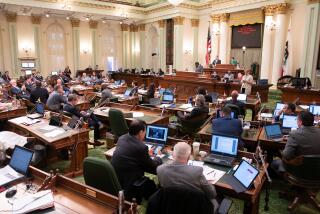Lobbying Limit on Former Insiders Dies in House
- Share via
WASHINGTON — A Senate proposal to toughen lobbying restrictions on former Congress members and senior staffers was killed for this year when the House gave final approval Thursday to a measure from which the provision had been dropped.
The rider to a $2.2-billion bill funding Congress and its agencies in 1997 would have forced retiring members to wait two years before they could lobby in the House or Senate on behalf of legislation.
The current waiting period is one year. Former staffers who earned more than $100,200 would have had to wait five years instead of one before lobbying their former bosses or the committees on which they had served.
House members opposed the changes during negotiations with the Senate. One aide complained privately that the provision was an “incumbent lobbyist protection act” that would not apply to those now lobbying Congress.
Others warned that the restrictions could drive qualified applicants away from congressional careers.
The provision would have addressed the “revolving door” that critics say has led to an inbred, inside-the-Beltway class of politicians, former politicians and aides making private deals on behalf of special interests with little public exposure.
“It’s going to be offered in the future, I’m confident of that,” said Sen. Connie Mack (R-Fla.), who drafted the spending bill in the Senate.
During their negotiations with their Senate counterparts, House conferees abandoned several initiatives of their own, including one that would have gutted the budget of the American Folklife Center in the Library of Congress and would have shifted it to the Smithsonian Institution. Congress created the center in 1976 to “preserve and present American folklife.”
In separate Senate spending action, the U.S. shipbuilding industry won an important victory when the Senate Appropriations Committee restored $44 million for the government’s main subsidy program for U.S. shipyards.
The subsidy consists of government-guaranteed loans for purchasers of vessels built in U.S. yards.
The committee accepted an amendment by Sen. Ted Stevens (R-Alaska) that overrode a subcommittee recommendation that the Title XI Maritime Guaranteed Loan Program, branded “corporate welfare” by some conservatives, be terminated.
On hand were lobbyists for the Shipbuilding Council of America, representing smaller, private yards that count on the subsidies to compete with subsidized foreign yards.
The administration and House support continuing the subsidies.
More to Read
Get the L.A. Times Politics newsletter
Deeply reported insights into legislation, politics and policy from Sacramento, Washington and beyond. In your inbox twice per week.
You may occasionally receive promotional content from the Los Angeles Times.










